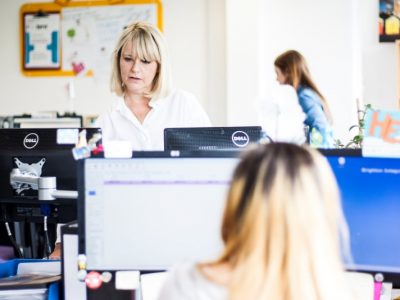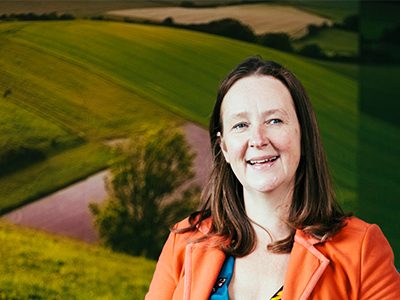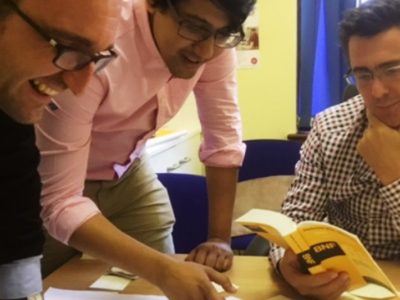Experiencing a new approach to care
I joined Here in July 2015, when it was known as BICS. I didn’t know a huge amount about the organisation at the time. My background was in social care and also in private healthcare which was very business-orientated. Working in social care felt like working in a system that didn’t meet the needs of the people it was meant to serve. We were being asked to take on packages of care – people’s care – and deliver it meaningfully in a system that is based on time allocation and driven by money. So, this really stretched our resources and it felt like that system was broken, meaning no matter how much we tried to deliver care more effectively – our clients may still have been isolated, lonely, depressed and ultimately not having their basic needs met.
Coming to Here (then BICS) was a complete turnaround. It was a really unusual experience coming into an organisation that provides space to think. What is great about the new Memory Assessment Service model is that we look at what citizens want and we shape our response around them, rather than saying ‘this is your service, this is the box you fit in, and we’ll push you into that and forget about your other needs’. Exploring a new approach – this has been really interesting and rewarding.
Learning through the re-design journey
In January 2016, Zoe Nicholson (our Chief Exec) began an action group based on ‘systems thinking’ to really examine what our memory assessment patients wanted as they were coming into our service. This involved going through a whole load of case studies and sitting in on clinical appointments. I had the opportunity to sit in and watch a clinician deliver a dementia diagnosis to a couple. It was really powerful. They looked so nervous and scared when they came in to the assessment. When they got the diagnosis of dementia, they were relieved in a way because they had thought it could be brain cancer. The couple’s next challenge was to take on the adjustment of the diagnosis. To go through all of that, to see what our patients go through, and see what our clinicians do – it was enlightening.
That action group went on for three months during which time we stepped out of the restrictions of our system and how it was commissioned to be delivered. We simply looked at what people were telling us they needed and how we could design a service that delivered upon their needs. Here then invested £73,000 to deliver what mattered to the patients, which is something that I still find really amazing – mainly because I don’t know any other organisation that I’ve worked with that would have completed this project and then invested significant funds into a service that would not result in profit for the organisation.
Here changed the system to make meaningful, long term difference to those who need it, their carers, families and communities. That was a real eye-opener about the people that we work with and their ability to see, and take, the opportunity to change our model for the better. That’s what has been really inspiring – new services can be mobilised or put in place, but if the system isn’t working then Here looks to change it and work with our commissioners and partners to get there. For me, that’s a real appeal of what Here does.
We also found that in order for the service to truly meet people’s needs, avoid crisis and reduce the decline of dependency that people were experiencing, we required additional staff. As a result of Here’s additional funding, in June 2016 we started recruiting to our Enhanced Support Service. Several months later, following the necessary planning and mobilising, we’re now in the position where we’ve got structure and are delivering new solutions based upon the learning. We have also carried out case study reviews and are receiving really positive feedback. All of this allows us to look at what we’re achieving and the real difference it is making to people’s lives.
Delivering impact through learning and growing
The service was first commissioned as an Assessment and Diagnosis service. Since then, we have grown to encompass a complete care journey, from diagnosis to treatment and support. Many of the people we serve have dementia, so it is difficult to gather feedback from them but we’ve used focus groups and questionnaires to pull together as much meaningful data as possible. The underlying learning is that it’s not a ‘one size fits all’ service. 70% of the people we asked said that diagnosis wasn’t important to them, but support was. We were commissioned to establish the diagnosis and then to provide the support, so we realised that there was still some way to go to create a model that fits with what matters most to people. Following the re-design, our recent review has found that 94% of people using the Memory Assessment Service (MAS) reported that it had delivered benefit to them.
The importance of supporting when it’s first needed
The crucial question we asked was “What happens to all the people who don’t get a diagnosis?” Our learning showed that people within the service, both those with memory difficulties and their carers or family members really needed support to help them live their life well and help manage the symptoms they were experiencing. While diagnosis might be important for medication purposes and accessing care in then wider community, Here heard that people needed both practical and emotional support as well. In the beginning, the MAS service provided good information and advice but lacked the capacity to do the doing. Advice and guidance may be suitable for high functioning patients in other services, however it is unrealistic to expect cognitively impaired patients to remember how and who to contact in times of need.
The key difference compared to the old system is that now they get the support when they are first identified as having memory difficulties. So, they are able to have care plans, onward referrals and visits from Memory Support Workers just for getting referred into the service. This serves to aid integration into the social networks within Brighton and Hove that most people wouldn’t know about otherwise. Our Memory Support Workers can have meaningful conversations with them at the point of referral and ensure that they receive the care and support they need. This helps our citizens to have a higher quality of life and ensure they are looked after and cared for. So, if a GP feels that someone needs help, they get it whether they are diagnosed or not. We hold them until we’ve delivered what they need. It might be that they want packages of care arranged, so we contact Access Point to make the referral.
Helping in more ways than one
In some cases the referral simply states ‘memory problems’ but actually the person is already in crisis and they need to be referred onwards. Often people are referred to us at a point when they just feel lonely or their family can no longer cope or help them, in which case our Memory Support Workers are able to make visits in order to seek understanding about their specific care requirements, with the goal of building a supportive foundation around them and serve as their advocate, helping them to navigate around what is available for them.
We can offer access to befriending services or invite them into our peer support groups. We now offer a form of treatment called Cognitive Stimulation Therapy (CST), which is available to anyone in the service who has received a diagnosis of dementia to help with cognitive issues associated with memory difficulties. There is research showing that this form of therapy may be as effective as (or in some cases more so) than medication – and medication is not suitable for everyone, meaning this offers a real alternative.
We’ve also created a pathway into the Wellbeing service, which we’re still developing. We are already seeing success in providing benefit to our patients through closer working relationships with services such as Wellbeing and secondary care.
The strength in serving our citizens this way is that it is very fluid and truly person centred. To be part of something so innovate that delivers the care that people want and need is truly rewarding and something that I am very proud of.
Case study report
You may also like

20.07.2016 | by Alison Melling
Partnering across sectors to transform Memory Care delivery

20.07.2016 | by Zoe Nicholson
Inspiring new ways of delivering what really matters to people

28.10.2016 | by Mark Cannon
'What Matters' Medicine


Teri Hilton on
This is as it should be, putting the patient first, involving them in their assessment and care! No scrimping, saving or labelling. You're doing a fantastic job, how wonderful to be part of something so innovative. Keep up the great work.